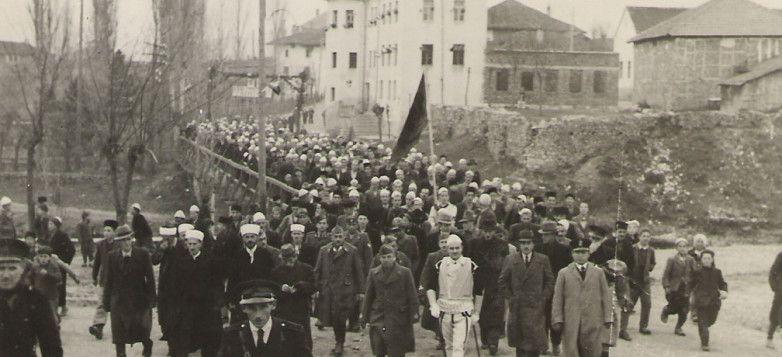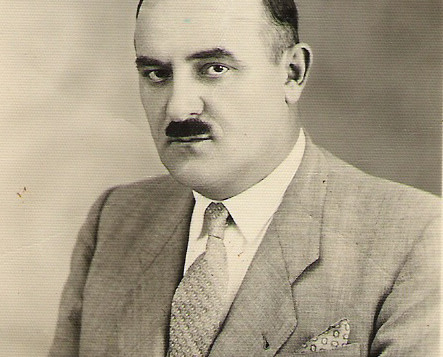On the early morning of August 30, 2014, the sound of cranes at work disturbed the peace and quiet of Gjakova, waking up its sleepy citizens. “What is happening?” they asked, running out of their homes to see for themselves. To their amazement, the house of Sylejman Beg Kryeziu, in the center of town, was being demolished with no warning sign or explanation.
Why was this house so important, that the Municipality of Gjakova had to demolish it in order to create a new park? “This house doesn’t belong to anyone, it has no use, and it has no purpose,” said Gjakova’s new democratic government officials in one of their statements on social media. “There is no one to claim this property,” they said.
However, this house has a long history. It stood there for generations as a silent gallery of souls, witnessing injustice after injustice done by different governments to the family Kryeziu and the people of Gjakova. This house belonged to my grandfather Sylejman Beg Kryeziu.
The only son of my great grandfather Myrteza Beg Jakova Kryeziu, Sylejman Beg Kryeziu was born in Gjakova in 1893 and died in 1961 in the city of Izmir, Turkey. Who was my grandfather, whom I never met?
He belonged to one of most patriotic families who were involved in the struggle for the independence of the Albanian people in Kosovo and Albania. I can only relate a few stories I heard from my mother and my aunts about a man with the heart of a lion and the kindness and generosity of a humble man. As my mother described him, he possessed qualities unseen until then: he helped young people get an education; provided help to the needy; created work for those who needed work; supported teachers; and had a great vision of freedom, where all people lived in unity, peace and harmony, with their needs met.
“He was so handsome,” my mother would say, “when he walked down the street he greeted everyone and looked like a king.” She remembered how he got married to my mother, “She was only fifteen years old. She was raised by her aunt after her mother died. They had recommended my father to her, and so he walked all dressed up, holding a flower, by her house, and she looked at him from the window. When she saw how handsome he was, she agreed to marry him. When her aunt died, she inherited all her property. They were prosperous.”
Sylejman Beg Kryeziu was the Governor of Gjakova and a parliamentarian of the Yugoslav Kingdom from 1925 to 1941. In 1937 he was also elected Vice-President of the regional administrative principalities of Shkup [Skopje] Macedonia, while from 1941 to 1943 he was only the Governor of Gjakova. He was the Governor of Gjakova for 18 years, yet no documents can be found anywhere about his service. How can such history disappear?
The police considered Sylejman Beg Kryeziu dangerous, and referred to him as an Italian agent, despite the fact that he was a Parliamentarian of the Yugoslav Kingdom.
The leaders of the Yugoslav Communists later thought that my grandfather had connections with the rebels called Ballists [Albanian National Front]. Regarding this issue, the Kosovo’s National Liberation Movement Division Commander proposed the removal of all Albanians from high positions such as governors, directors, presidents, etc. Loyal Serbian citizens and good nationalists replaced them. Thus, after the war ended the clean- up process began.
Although the Italian Fascists had occupied Gjakova, it was almost fashionable to consider all high-ranking officials collaborators. My grandfather was no one’s agent, he had been very protective of his municipality and its people.
In every meeting that my grandfather had with the Italian occupying authorities, he was dressed in the national costume, because he wanted to emphasize his national identity, while he was going along with the occupiers in order to protect his people.
In 1944, after the Italians left Gjakova, the German Nazis came. I remember a story from my family circles, “One night everyone was seated inside the house, the high wooden doors were locked. Father was not home that evening, when a heavy knock on the door was heard. When grandma went to open the door, the SS Nazi police led by Xhafer Deva [an Albanian Nazi collaborator] came in, looking for my grandfather. They searched the house high and low, while bread was being baked under saq [small coal oven] outside in the garden. When a cat got scared and jumped over the saq, the police turned around and shot it. The children were mortified.”
As I write this story my mother says, “They used to come often at night in search of something. They lined up all us children against the wall and pointed their guns at us. My legs were always shaking. They killed mostly during market days. They hung people for others to see them, that’s how they frightened us.”
Another memory is that one day German Nazi agents came back to grandfather’s home and Xhafer Deva asked him, “Tell us who is a Communist in your city. Give us all their names.” “We have no Communists in this city,” was grandfather’s answer. They told him to better think twice because his refusal to cooperate could cost him his life and left. When he returned inside the house my grandmother asked him, “What happened?” He told her what the Germans had said and what his answer had been. “My God, what have you done!” she said, “They will persecute you.” “How can I give up their names, most of Gjakova’s youth is against occupation, they don’t even know what Communist means, to give them up would mean giving up my children,” he said.
My uncles kept a typewriter that some of their friends used to publish pamphlets against the occupation. Grandmother Emine Polloshka Kryeziu took this typewriter during the night, when everyone was asleep, and buried it in the fields, mixing them with manure. The next day, when the German SS police returned to search the house and asked for the typewriter, grandma answered, “We don’t have any typewriter, the children have buried it a long time ago.” The police asked her to show them the place where it was buried. She brought them to the field, and while they were digging to find the typewriter grandma said, “My whole body was shaking from fear, they would kill me and my family if they found it. But what they found was an old rusty typewriter that had been destroyed overnight.” They left her there and walked away having failed to find what they were looking for.


